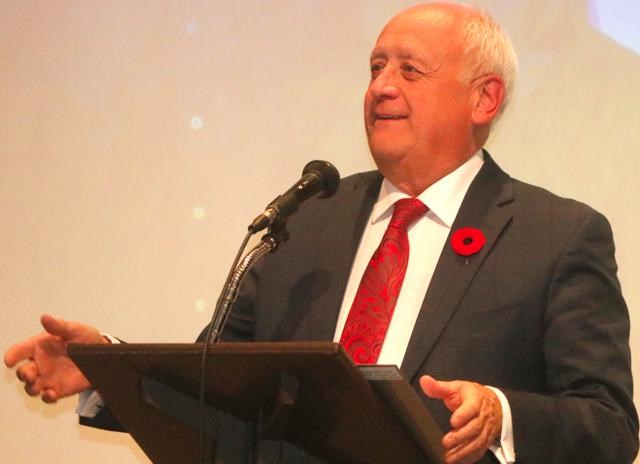Saskatchewan’s Agriculture minister David Marit is working on expanding the markets available for this province’s agricultural products, he told business owners and farmers at the Farmer Appreciation Banquet on Nov. 5 at McKenna Hall.
The annual event is hosted by the Weyburn Chamber of Commerce, with the presentation of the Golden Sheaf Award. This year, that award went to Brad and Leean Barlow of Crow Lake Farms near Griffin.
Marit gave an update on how the industry is doing right now, noting that China had just announced they would once again be taking beef and pork imports from Canada.
“That’s good news for the livestock industry here in Saskatchewan,” he said, noting that Saskatchewan is the fifth-largest hog producer in Canada, producing 1.8 million head of hogs, and the second-largest cow-calf producers, behind only Alberta.
“We’re still challenged with canola, as you know, but we’re really committed to trade,” said Marit.
He just returned from a trade mission to Mexico, which is this province’s fourth-largest trade partner, and met with industry representatives as well as government officials.
One of the states he visited has a population of 20 million, producing wheat, canola, millet and oats, and in that state he saw a large family-run operation that produces canola oil and pulp, making 500 tonnes of canola oil every day. Currently 20 per cent of what they produce is canola oil and 80 per cent is pulp, but their plan is to reverse that to 80 per cent canola oil within the next three years.
“The reason is environmental sustainability. They don’t like what countries are doing in destroying palm trees. That’s what customers are looking for, is taking care of the environment,” said Marit, noting that this family’s oldest son will be traveling here to visit Agribition later in November, to see what agricultural connections they can make with this province.
Another farm that he and others in the trade delegation visited had a large and diverse number of livestock, including one million chickens, 2,000 milk cows, 30,000 pigs and so on. “It was phenomenal,” he said.
Saskatchewan’s focus on producing safe high-quality food is a big selling point, said Marit, and is one of the bases of trade as he tries to expand the export markets for the province’s producers.
For example, he is looking at new markets like Bangladesh and Indonesia for our wheat and canola, “countries that are growing in population and their diets are changing. We’re going to go hard to try and grow these markets.”
The minister acknowledged this has been a very challenging harvest time throughout the province.
“I know exactly what everybody is going through. This just proves the resiliency of our farmers,” Marit said, noting they were able to finish their harvest about 10 days before, around the time when he and his brother were selling their farm land and equipment in the Fife Lake area.
As they were not able to use their equipment (to prepare for their farm auction), neighbours came over and lent a hand in getting their crops off, something that happens all over this province.
“As one neighbour finishes up, they then go over to help another neighbour finish. That’s what we do here,” said Marit, pointing out a recent example where a Southey-area farm family experienced a tragedy, and 50 of their neighbours pitched in to help get their crops off. “That’s what it’s all about in Saskatchewan, and what it always will be about.”
He added that environmental sustainability is also a big part of farming in this province, noting a recent CFIB survey that showed 98 per cent of farmers said they will implement ways to protect the environment in their farm operations.



